The Law of Finite Resources
The Future of Indigenous Environmental Stewardship is not Earth-bound.

Futures Narrative
October 2023
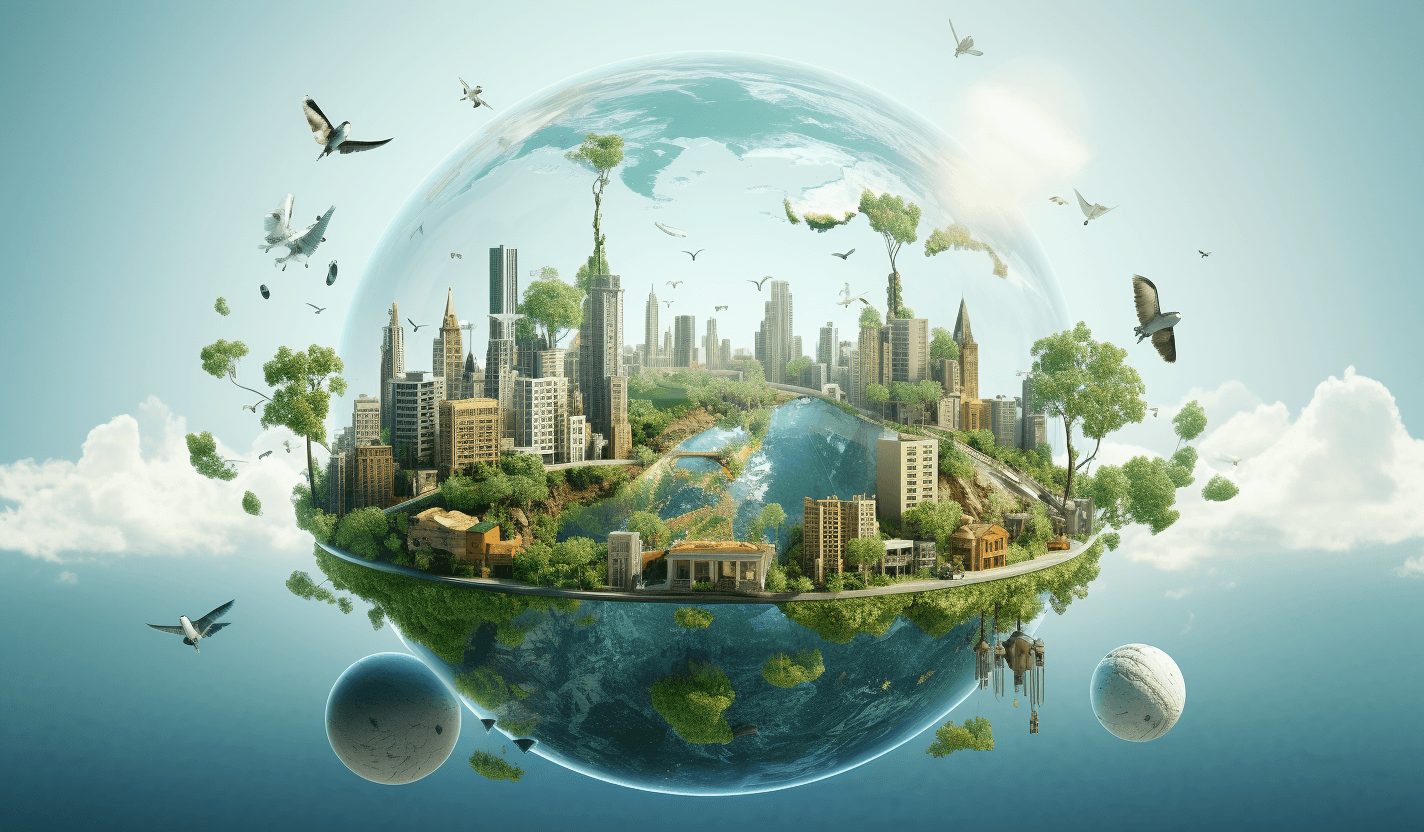

It feels more important than ever, that we begin the work of working to practice imagining possible alternative futures for first nations people.
/ Australian Context
On 14 October 2023, Australians voted NO in a referendum on whether to change the 1898 constitution to recognise the First Peoples of Australia through the establishment of a Voice to Parliament, which would advise the government about laws as they relate to indigenous peoples.
The Voice was the first recommendation from the Uluru Statement, which also includes a treaty-making and truth-telling process, aimed at reconciling Australia's past and the ongoing exclusion of indigenous peoples from Australia's imagined futures, and the systems which enable those imagined futures to develop.
Whilst initial support suggested the Voice to Parliament would proceed, it was ultimately defeated and the public's appetite for further truth and treaty work has since dropped significantly. Richard Flanagan's message 'that we continue to enshrine ourselves in the European / American imagination', identifies the urgency with which Australians must work to reimagine Australian futures, from within the context of our own painful history and the first people who continue to be excluded from our national imagination and stories.
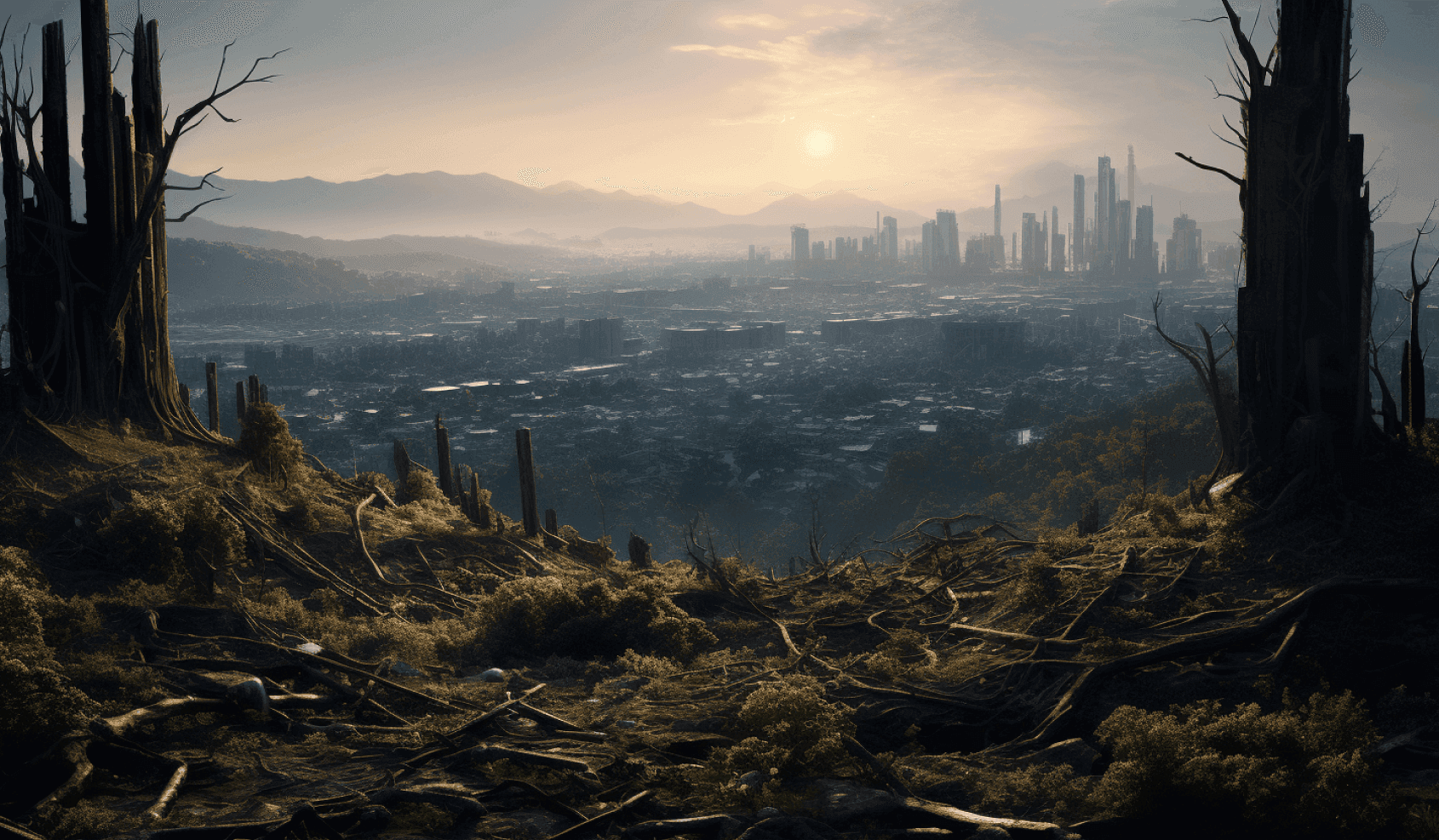
Future Wheels
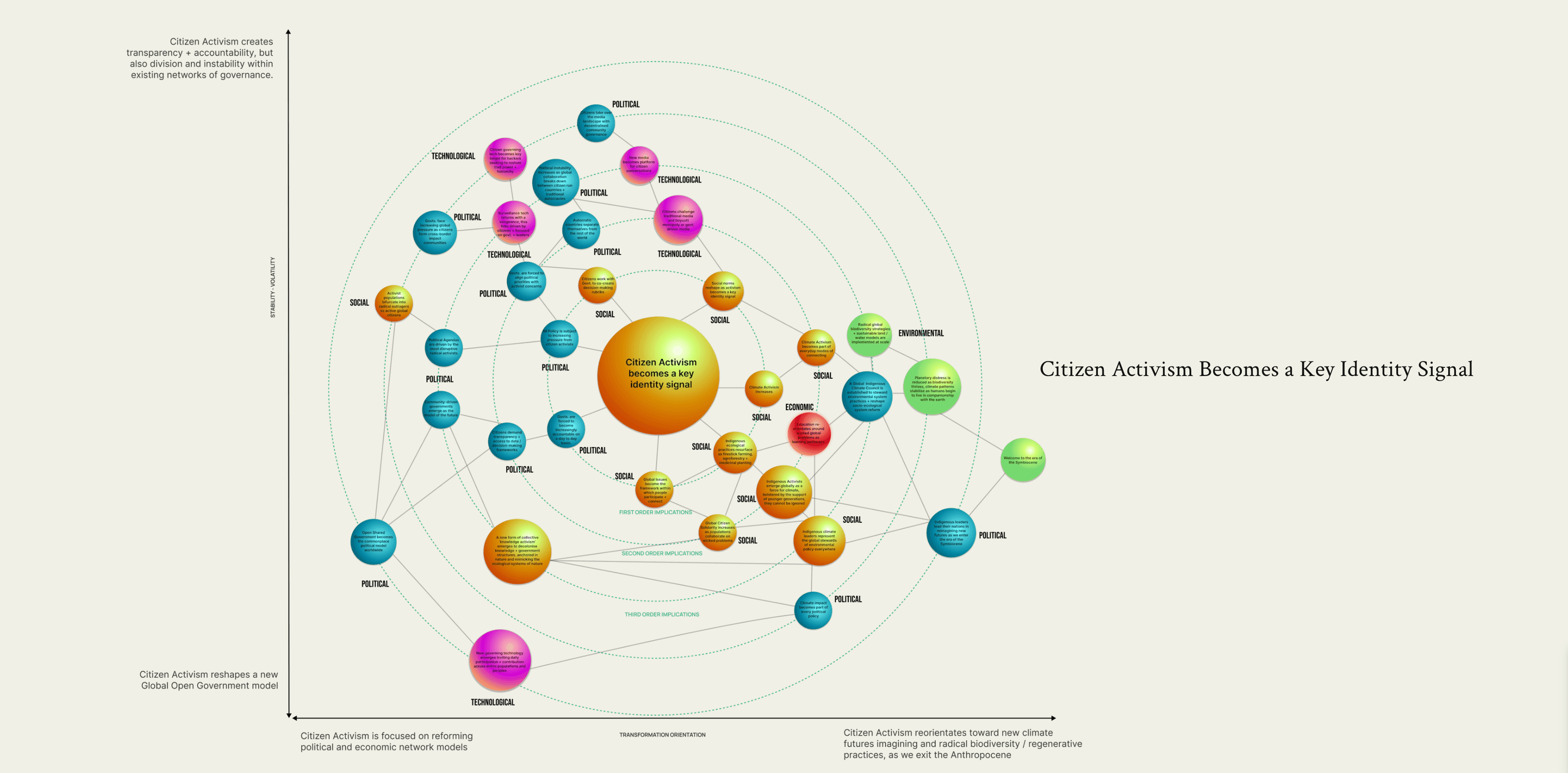

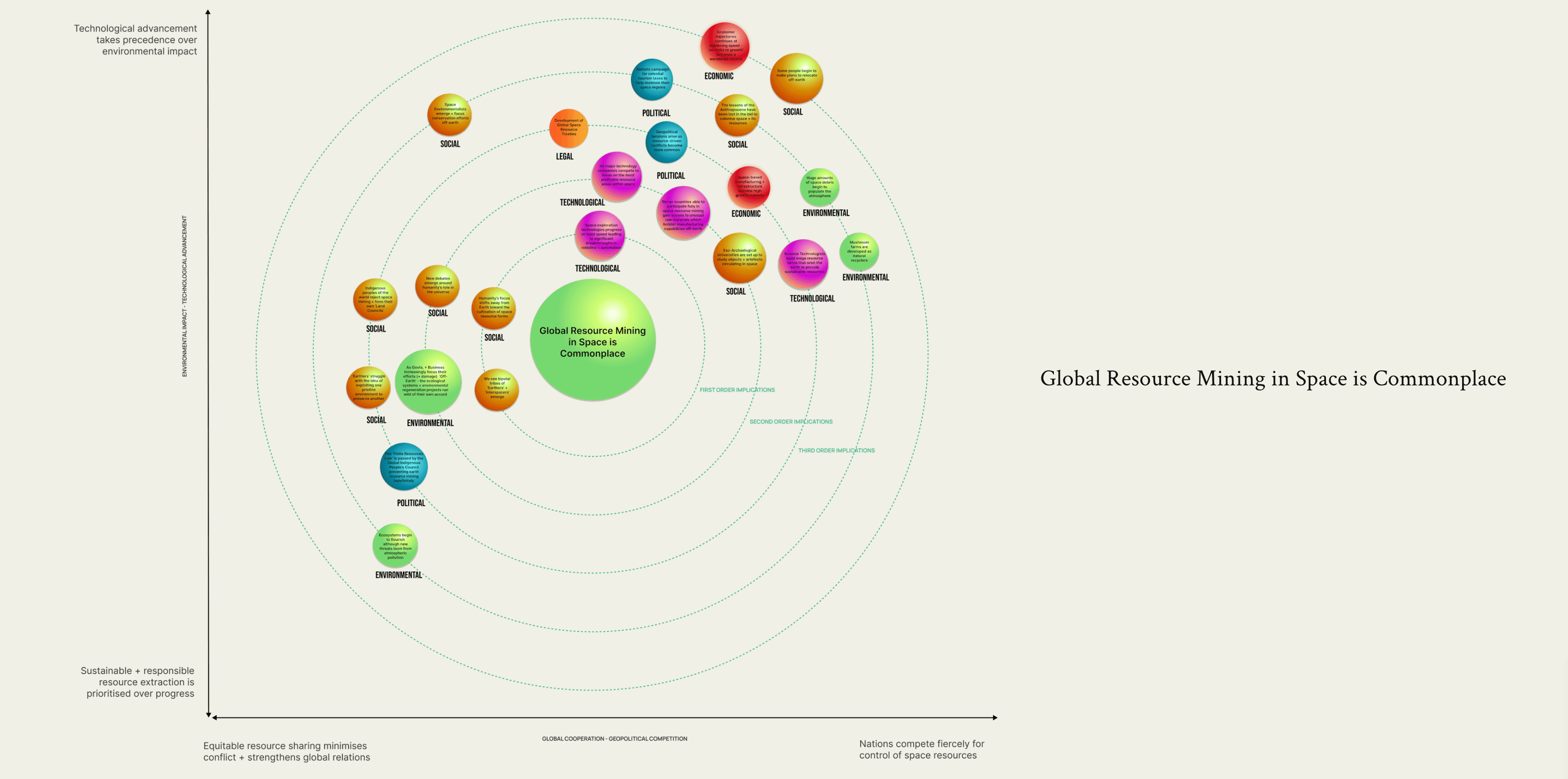
Cross Impact Analysis
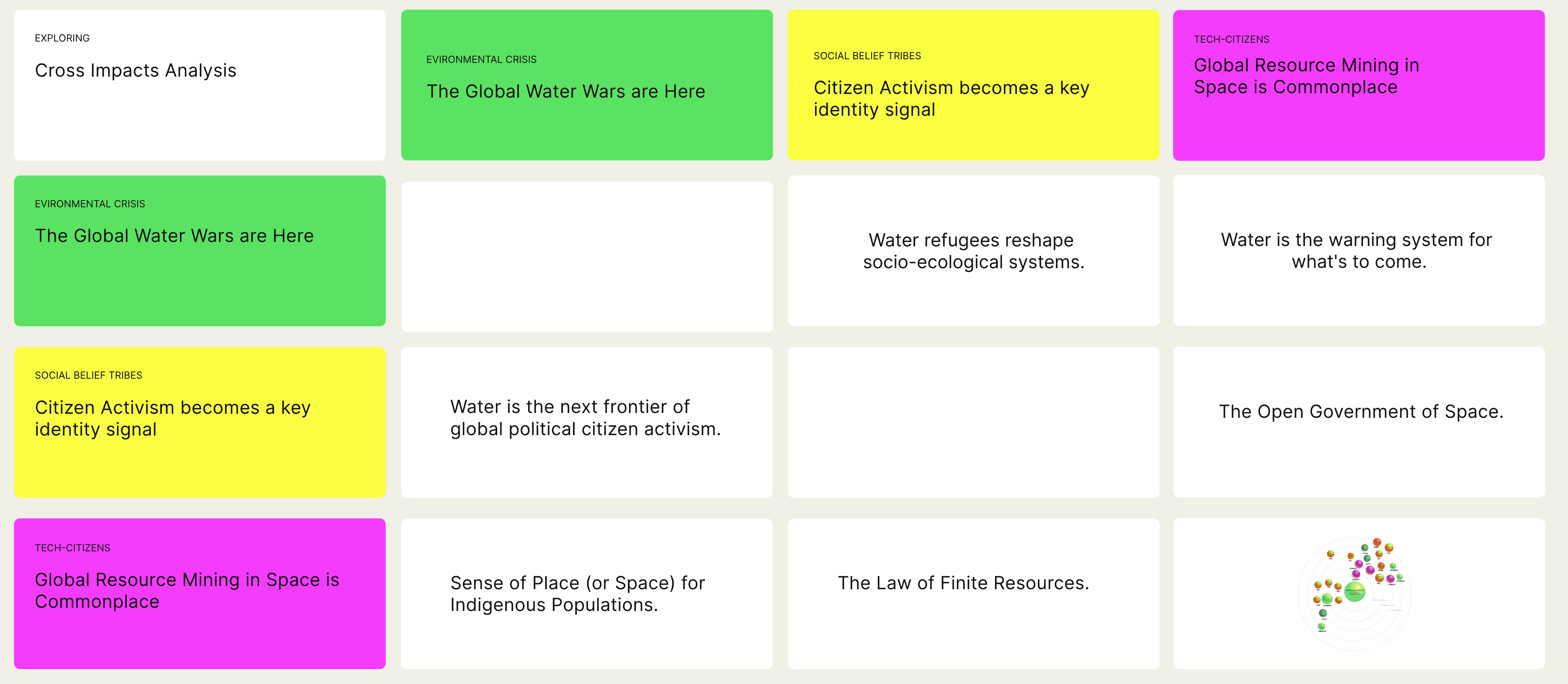
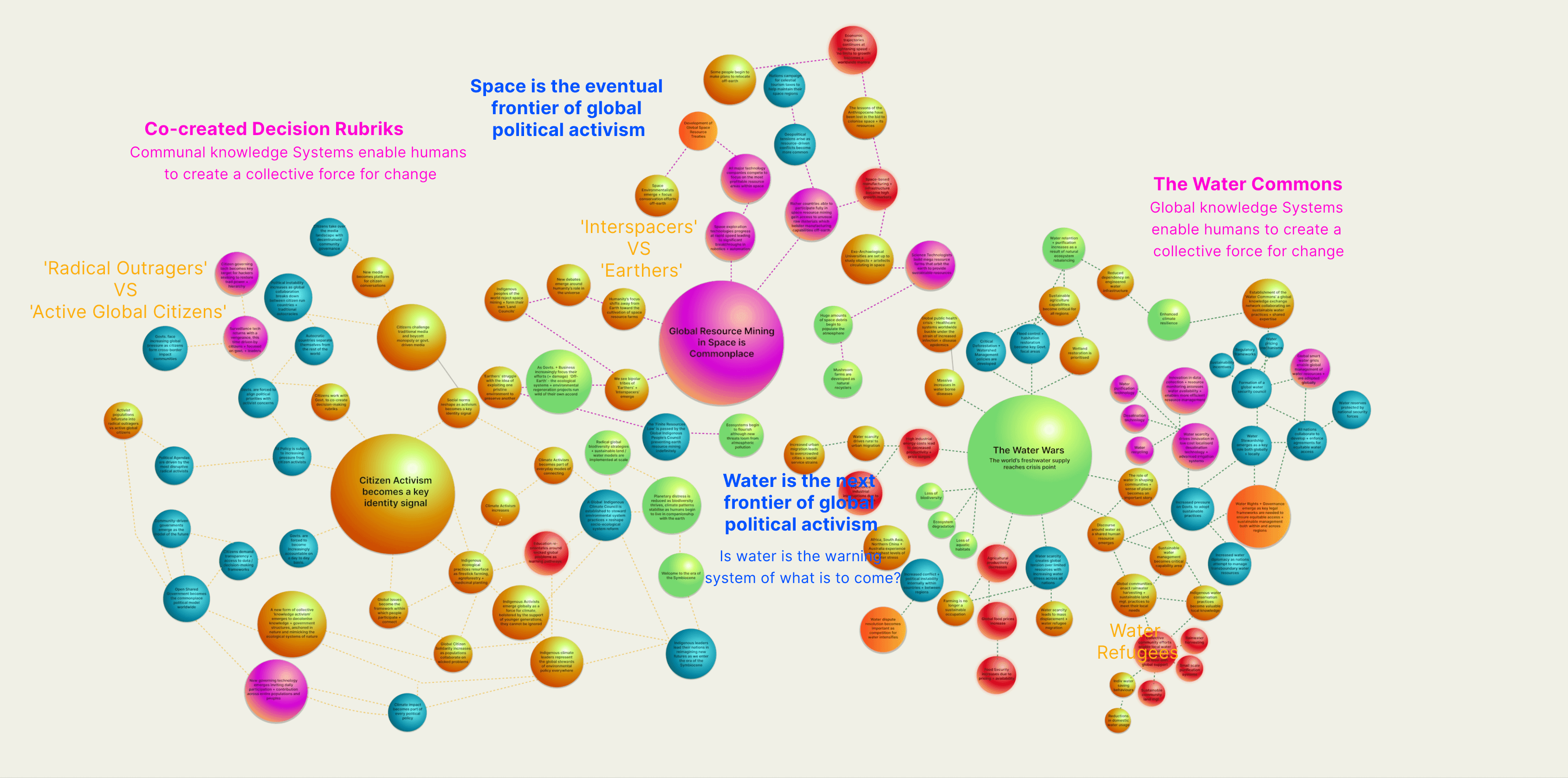

Scenario # | The Law of Finite Resources
The Future of Indigenous Environmental Stewardship cannot be Earth-bound.
Humans will always be connected to a sense of place. Whether it's the land from which they were born, the ocean from which they draw life or the space from which their community gathers.
The wars on water have begun. This future is characterised by competition for water resources which drives constant geopolitical conflict as we witness the continual depletion of the earth's fresh water supply. New governance structures around water diplomacy led to the formation of a global water council and the establishment of the Water Commons.
As humans push further beyond the planet's boundaries seeking new resources within outer space; it is the indigenous peoples of the world who continue to teach us that resources are always more than just fuel for progress. Over time, we are able to develop a shared understanding of the role that water . . and land . . and even space play, in helping us locate ourselves both within the world, within our communities and in context to each other. These indigenous knowledge systems enable a collective global force for change.
It is the indigenous populations across the globe who have risen up to form our collective consciousness; not to protest against progress or fight against leadership, but to remind us . . that the fight to be had is not against corporates or space mining companies or even governments. That the greatest battle to be had . . is within ourselves. The state of our waterways is a reflection of the depths of our soul they tell us in their stories; the answer is not in a journey further to seek further fuel for the fire of progress, but to create active knowledge circles of healing and restoration. So that one day we might heal ourselves, and in doing so, the planet.
It feels more important than ever, that we begin the work of working to practice imagining possible alternative futures for first nations people.
/ Australian Context
On 14 October 2023, Australians voted NO in a referendum on whether to change the 1898 constitution to recognise the First Peoples of Australia through the establishment of a Voice to Parliament, which would advise the government about laws as they relate to indigenous peoples.
The Voice was the first recommendation from the Uluru Statement, which also includes a treaty-making and truth-telling process, aimed at reconciling Australia's past and the ongoing exclusion of indigenous peoples from Australia's imagined futures, and the systems which enable those imagined futures to develop.
Whilst initial support suggested the Voice to Parliament would proceed, it was ultimately defeated and the public's appetite for further truth and treaty work has since dropped significantly. Richard Flanagan's message 'that we continue to enshrine ourselves in the European / American imagination', identifies the urgency with which Australians must work to reimagine Australian futures, from within the context of our own painful history and the first people who continue to be excluded from our national imagination and stories.

Future Wheels



Cross Impact Analysis



Scenario # | The Law of Finite Resources
The Future of Indigenous Environmental Stewardship cannot be Earth-bound.
Humans will always be connected to a sense of place. Whether it's the land from which they were born, the ocean from which they draw life or the space from which their community gathers.
The wars on water have begun. This future is characterised by competition for water resources which drives constant geopolitical conflict as we witness the continual depletion of the earth's fresh water supply. New governance structures around water diplomacy led to the formation of a global water council and the establishment of the Water Commons.
As humans push further beyond the planet's boundaries seeking new resources within outer space; it is the indigenous peoples of the world who continue to teach us that resources are always more than just fuel for progress. Over time, we are able to develop a shared understanding of the role that water . . and land . . and even space play, in helping us locate ourselves both within the world, within our communities and in context to each other. These indigenous knowledge systems enable a collective global force for change.
It is the indigenous populations across the globe who have risen up to form our collective consciousness; not to protest against progress or fight against leadership, but to remind us . . that the fight to be had is not against corporates or space mining companies or even governments. That the greatest battle to be had . . is within ourselves. The state of our waterways is a reflection of the depths of our soul they tell us in their stories; the answer is not in a journey further to seek further fuel for the fire of progress, but to create active knowledge circles of healing and restoration. So that one day we might heal ourselves, and in doing so, the planet.
It feels more important than ever, that we begin the work of working to practice imagining possible alternative futures for first nations people.
/ Australian Context
On 14 October 2023, Australians voted NO in a referendum on whether to change the 1898 constitution to recognise the First Peoples of Australia through the establishment of a Voice to Parliament, which would advise the government about laws as they relate to indigenous peoples.
The Voice was the first recommendation from the Uluru Statement, which also includes a treaty-making and truth-telling process, aimed at reconciling Australia's past and the ongoing exclusion of indigenous peoples from Australia's imagined futures, and the systems which enable those imagined futures to develop.
Whilst initial support suggested the Voice to Parliament would proceed, it was ultimately defeated and the public's appetite for further truth and treaty work has since dropped significantly. Richard Flanagan's message 'that we continue to enshrine ourselves in the European / American imagination', identifies the urgency with which Australians must work to reimagine Australian futures, from within the context of our own painful history and the first people who continue to be excluded from our national imagination and stories.

Future Wheels



Cross Impact Analysis



Scenario # | The Law of Finite Resources
The Future of Indigenous Environmental Stewardship cannot be Earth-bound.
Humans will always be connected to a sense of place. Whether it's the land from which they were born, the ocean from which they draw life or the space from which their community gathers.
The wars on water have begun. This future is characterised by competition for water resources which drives constant geopolitical conflict as we witness the continual depletion of the earth's fresh water supply. New governance structures around water diplomacy led to the formation of a global water council and the establishment of the Water Commons.
As humans push further beyond the planet's boundaries seeking new resources within outer space; it is the indigenous peoples of the world who continue to teach us that resources are always more than just fuel for progress. Over time, we are able to develop a shared understanding of the role that water . . and land . . and even space play, in helping us locate ourselves both within the world, within our communities and in context to each other. These indigenous knowledge systems enable a collective global force for change.
It is the indigenous populations across the globe who have risen up to form our collective consciousness; not to protest against progress or fight against leadership, but to remind us . . that the fight to be had is not against corporates or space mining companies or even governments. That the greatest battle to be had . . is within ourselves. The state of our waterways is a reflection of the depths of our soul they tell us in their stories; the answer is not in a journey further to seek further fuel for the fire of progress, but to create active knowledge circles of healing and restoration. So that one day we might heal ourselves, and in doing so, the planet.
It feels more important than ever, that we begin the work of working to practice imagining possible alternative futures for first nations people.
/ Australian Context
On 14 October 2023, Australians voted NO in a referendum on whether to change the 1898 constitution to recognise the First Peoples of Australia through the establishment of a Voice to Parliament, which would advise the government about laws as they relate to indigenous peoples.
The Voice was the first recommendation from the Uluru Statement, which also includes a treaty-making and truth-telling process, aimed at reconciling Australia's past and the ongoing exclusion of indigenous peoples from Australia's imagined futures, and the systems which enable those imagined futures to develop.
Whilst initial support suggested the Voice to Parliament would proceed, it was ultimately defeated and the public's appetite for further truth and treaty work has since dropped significantly. Richard Flanagan's message 'that we continue to enshrine ourselves in the European / American imagination', identifies the urgency with which Australians must work to reimagine Australian futures, from within the context of our own painful history and the first people who continue to be excluded from our national imagination and stories.

Future Wheels



Cross Impact Analysis



Scenario # | The Law of Finite Resources
The Future of Indigenous Environmental Stewardship cannot be Earth-bound.
Humans will always be connected to a sense of place. Whether it's the land from which they were born, the ocean from which they draw life or the space from which their community gathers.
The wars on water have begun. This future is characterised by competition for water resources which drives constant geopolitical conflict as we witness the continual depletion of the earth's fresh water supply. New governance structures around water diplomacy led to the formation of a global water council and the establishment of the Water Commons.
As humans push further beyond the planet's boundaries seeking new resources within outer space; it is the indigenous peoples of the world who continue to teach us that resources are always more than just fuel for progress. Over time, we are able to develop a shared understanding of the role that water . . and land . . and even space play, in helping us locate ourselves both within the world, within our communities and in context to each other. These indigenous knowledge systems enable a collective global force for change.
It is the indigenous populations across the globe who have risen up to form our collective consciousness; not to protest against progress or fight against leadership, but to remind us . . that the fight to be had is not against corporates or space mining companies or even governments. That the greatest battle to be had . . is within ourselves. The state of our waterways is a reflection of the depths of our soul they tell us in their stories; the answer is not in a journey further to seek further fuel for the fire of progress, but to create active knowledge circles of healing and restoration. So that one day we might heal ourselves, and in doing so, the planet.
It feels more important than ever, that we begin the work of working to practice imagining possible alternative futures for first nations people.
/ Australian Context
On 14 October 2023, Australians voted NO in a referendum on whether to change the 1898 constitution to recognise the First Peoples of Australia through the establishment of a Voice to Parliament, which would advise the government about laws as they relate to indigenous peoples.
The Voice was the first recommendation from the Uluru Statement, which also includes a treaty-making and truth-telling process, aimed at reconciling Australia's past and the ongoing exclusion of indigenous peoples from Australia's imagined futures, and the systems which enable those imagined futures to develop.
Whilst initial support suggested the Voice to Parliament would proceed, it was ultimately defeated and the public's appetite for further truth and treaty work has since dropped significantly. Richard Flanagan's message 'that we continue to enshrine ourselves in the European / American imagination', identifies the urgency with which Australians must work to reimagine Australian futures, from within the context of our own painful history and the first people who continue to be excluded from our national imagination and stories.

Future Wheels



Cross Impact Analysis



Scenario # | The Law of Finite Resources
The Future of Indigenous Environmental Stewardship cannot be Earth-bound.
Humans will always be connected to a sense of place. Whether it's the land from which they were born, the ocean from which they draw life or the space from which their community gathers.
The wars on water have begun. This future is characterised by competition for water resources which drives constant geopolitical conflict as we witness the continual depletion of the earth's fresh water supply. New governance structures around water diplomacy led to the formation of a global water council and the establishment of the Water Commons.
As humans push further beyond the planet's boundaries seeking new resources within outer space; it is the indigenous peoples of the world who continue to teach us that resources are always more than just fuel for progress. Over time, we are able to develop a shared understanding of the role that water . . and land . . and even space play, in helping us locate ourselves both within the world, within our communities and in context to each other. These indigenous knowledge systems enable a collective global force for change.
It is the indigenous populations across the globe who have risen up to form our collective consciousness; not to protest against progress or fight against leadership, but to remind us . . that the fight to be had is not against corporates or space mining companies or even governments. That the greatest battle to be had . . is within ourselves. The state of our waterways is a reflection of the depths of our soul they tell us in their stories; the answer is not in a journey further to seek further fuel for the fire of progress, but to create active knowledge circles of healing and restoration. So that one day we might heal ourselves, and in doing so, the planet.
Tags
indigenous futures, environmental stewardship, Anthropocene
⚒️ | Midjourney | Pitch
You might also like
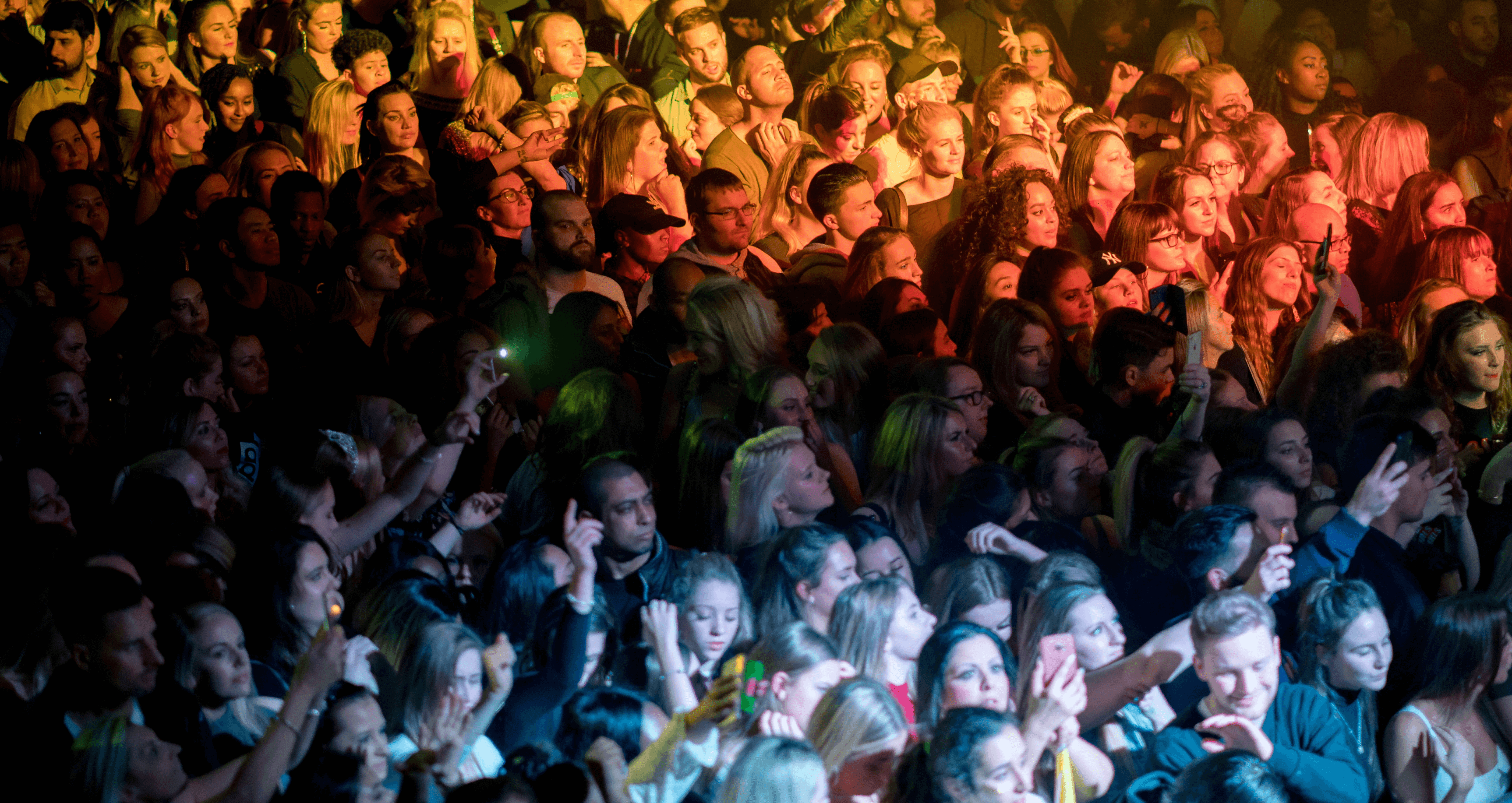
Political Notion
Information Architecture

Political Notion
Information Architecture

Neurodiversity Resources
Concept Development

Neurodiversity Resources
Concept Development
🛠️ Tools + Resources